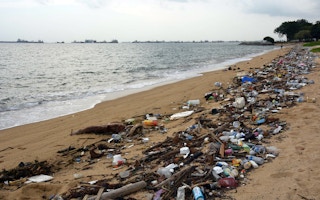Donald Trump has done many things to tarnish America’s reputation, but his decision to walk away from the Paris Agreement is probably the most internationally symbolic and damaging. That a US president can put climate change denial at the centre of his climate and energy policy is truly unprecedented, and it is difficult to remember an administration that has been so intent on undermining the intellectual and scientific findings on global warming.
Fighting back against Trump’s climate folly seems to be an uphill task. Even the impending publication of the Climate Science Special Report, drafted by scientists from 13 federal agencies, is unlikely to do much. The final report is expected to warn of the dangers of climate change, but it will most likely be surreptitiously sidelined.
One of the reasons behind Trump’s bullish attitude might be to do with public opinion in the US. In a poll carried out by Yale University in 2016, 70 per cent of Americans said they believed in global warming and 58 per cent believed that it will harm Americans. However, only 40 per cent believe that it will actually impact them individually. Furthermore, just 24 per cent said they heard about global warming in the media every week.
In a poll conducted by the Pew Research Centre this year, 76 per cent said terrorism should be a top priority for the administration. Only 38 per cent mentioned global warming. The polls suggest that Americans might be concerned about global warming and want more to be done about it. But they are more likely to be worried about, say, Kim Jong-un than climate change.
It appears that confronting Trump – or any other climate denier – on the basis of facts simply won’t work. The challenge should perhaps be to first rally public opinion until there is an overwhelming consensus that serious and urgent action is needed.
One practical short-term solution might be to shift the public discourse from “climate change” to “pollution”. Focusing on pollution has three advantages that may mean it moves public opinion better than global warming.
Can’t see ‘warming’
First, pollution is tangible. The fact that glaciers are melting might be alarming but it is not something that most of us experience in everyday life. And why would a rise in temperature matter as much to someone living in Sacramento, California, where it is already hot and where one can find shelter in air conditioned buildings?
Pollution, however, can be experienced on a daily basis and causes nuisances of all sorts. The same Sacramento resident who is indifferent to global warming might be concerned with the pollution in their local urban river parkway, for instance. In addition, reports claiming that there are millions of annual deaths from air pollution have a different, more personal ring from those making the more abstract claim that “global temperatures” are rising fast.
People care about pollution
Americans also seem to be more concerned about the environment than global warming. In the same opinion poll carried out by Pew, 55 per cent of Americans saw “the environment” as a priority, a similar score to crime or poverty (and comfortably ahead of the military, immigration or “global warming”). They seem to be more worried about the quality of air and water where they live rather than losing sleep over a global climate phenomenon.
What might also be encouraging is a poll carried out by the Center for American Progress this year which showed around two-thirds of those who voted for Trump opposed the idea of privatising or selling off America’s national forests and public lands. Whether this is a strong enough basis for there to be a rallying of the public is difficult to know. Nevertheless, focusing on the local environment is a good start.
“
Confronting Trump – or any other climate denier – on the basis of facts simply won’t work. The challenge should perhaps be to first rally public opinion until there is an overwhelming consensus that serious and urgent action is needed.
You, the expert
A focus on pollution might also actually open up the debate on the environment and encourage some kind of grassroot reaction. Too often the discourse on the environment and global warming has been dominated by scientific experts and politicians. As such, the public might believe that this is a matter of scientific debate that somehow they cannot participate in, without some prior knowledge. After all, what can you, personally, contribute to a debate on carbon dioxide parts-per-million, or melting glaciers? Would you even know either was a problem if scientists hadn’t warned us?
By contrast, feeling the effects of environmental pollution does not require expert knowledge. The public can express remedial actions and suggestions, without having to pretend that they understand atmospheric science. Moreover, actions are more likely to be taken on a local level if the focus is on local pollution.
![]() The public should be scientists’ first ally in this battle. Any language and issues that engage people against Trump’s climate folly in whatever way should be the priority for scientists and policymakers seeking to address the problem.
The public should be scientists’ first ally in this battle. Any language and issues that engage people against Trump’s climate folly in whatever way should be the priority for scientists and policymakers seeking to address the problem.
Tae Hoon Kim is Researcher in Energy Politics at the University of Cambridge. This article was originally published on The Conversation.











